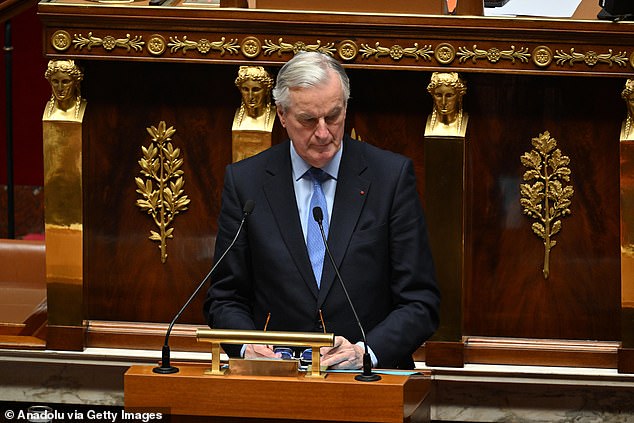The French government has collapsed after the Prime Minister lost a no confidence vote in the French parliament.
Michel Barnier has become the first prime minister since 1962 to be to be forced out by a no-confidence vote.
French lawmakers voted 331 out of 574 in support of the motion with the far-left and far-right coming together in an unholy alliance.
The lifespan of Barnier’s government is the shortest of any administration in the history France’s Fifth Republic, which began in 1958. Having only been appointed prime minister less than three months.
The vote comes after Barnier was unable to pass his budget for next year which proposed 60 billion euros in tax hikes and spending cuts in a bid to tackled France‘s financial woes.
These cuts and taxes rises were aimed at tackling the country’s deficit which stands at over six per cent of the entire economy and is twice as much as the limit imposed by the European Union.
The President of France Emmanuel Macron now faces the task of hiring his fourth pm in less than a year as opposition politicians call for him to step down.
Macron plans to name a new prime minister very quickly, possibly even before the grand reopening of Notre-Dame Cathedral at the weekend, according to sources in Macron’s camp, including parliamentary sources.
Ahead of the vote, National Rally leader Marine Le Pen said: ‘We have arrived at the moment of truth.’

Michel Barnier has become the first prime minister since 1962 to be to be forced out by a no-confidence vote

The President of France Emmanuel Macron now faces the task of hiring his fourth pm in less than a year as opposition politicians call for him to step down

Marine Le Pen said earlier today that Barnier would be voted down because his austerity budget plans for next year were ‘dangerous and unfair’ and meant ‘chaos’ for France
She added that Barnier would be voted down because his austerity budget plans for next year were ‘dangerous and unfair’ and meant ‘chaos’ for France.
And hard left France Unbowed lawmaker Eric Coquerel told Barnier: ‘You will be the first prime minister to be censured since Georges Pompidou in 1962.’
He said a majority of French citizens backed the no-confidence motion and argued that Barnier, appointed by President Emmanuel Macron in September, nearly two months after an inconclusive snap election, had lacked legitimacy from the start.
Macron’s plan to torpedo a new pm into the job quickly to avoid leaving a hole at the heart of the European Union at a time when Germany is also weakened and in election mode, and weeks before U.S. President-elect Donald Trump re-enters the White House.
But any new prime minister would face the same challenges as Barnier in getting bills, including the 2025 budget, adopted by a divided parliament. There can be no new parliamentary election before July.
The lifespan of Barnier’s government is the shortest of any administration of France’s Fifth Republic, which began in 1958.
What’s more, Barnier’s ousting would leave France mired in a lingering political crisis, as no new elections can be called within a year of the previous legislative polls.
Macron, who won a second mandate in 2022, in many ways caused the recent crisis by calling the snap parliamentary election in June – which saw Macron’s centrist Ensemble party slump to second place behind the far left.
His term as president runs until mid-2027 and he cannot be forced out by parliament, but the RN and the hard left have already been saying he should resign as he faces his biggest crisis since the Yellow Vest popular unrest of 2018-19.

Barnier has has been prime minister for less than three months having been appointed in September

Macron with Barnier during commemorations for Armistice Day. The lifespan of Barnier’s government is the shortest of any administration of France’s Fifth Republic, which began in 1958
Several prominent opposition figures and even some voices closer to the presidential faction have suggested resignation could be Macron’s only viable option to avoid plunging France into chaos.
His term as president runs until mid-2027 and he cannot be forced out by parliament, but the RN and the hard left have called on him to step down early as he faces his biggest crisis since the Yellow Vest popular unrest of 2018-2019.
The head of the Socialist party, Olivier Faure, called on Macron to make his intentions clear should the Barnier government fall.
‘Rather than dropping little remarks… Emmanuel Macron now needs to speak to the French people,’ Faure told Le Monde daily in remarks published on Wednesday.
‘How can he leave the French people in this uncertainty just before Christmas?’
But Macron was quick to disparage Faure for the comments, telling reporters on the sidelines of his state visit to Saudi Arabia earlier this week: ‘It’s frankly not up to scratch to say these things.’
Macron also accused Le Pen’s RN of ‘unbearable cynicism’ in backing the no-confidence motion.
‘We must not scare people with these things,’ he said.
Meanwhile, concerns have been raised that political turmoil in France could turn into economic turmoil for the rest of European Union.
Investor are concerned that if the government does fall any effort to cut borrowing will be jettisoned and without a credible alternative plan from the opposition parties there is a risk of an economic crisis.
And with echoes of the economic crisis that started in Greece in 2008, which had a budget deficit that reached a dizzyingly high 15 percent, many economists are concerned about it spreading to other Eurozone countries.
‘We are in a critical moment for France,’ Mr Retailleau told TF1. ‘We risk chaos, we risk a financial crisis’ similar to the ‘public debt crisis in Greece in 2008’.
Source link






